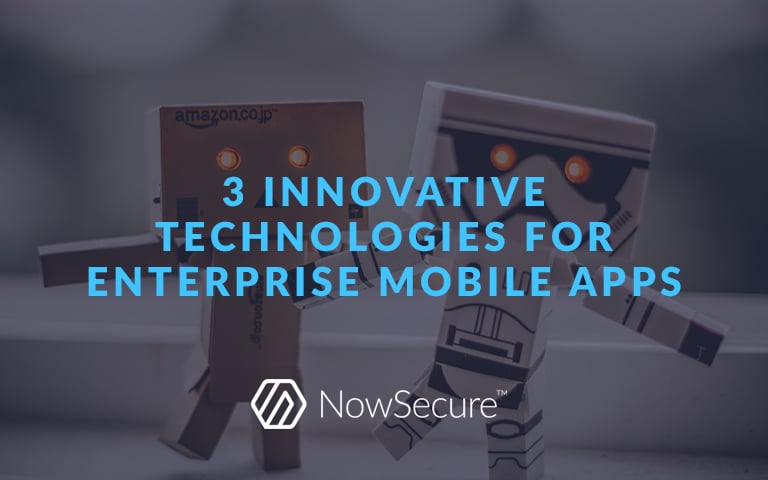Today’s increasingly mobile employees want the flexibility to access organization mobile apps and data on their smartphones and tablets to do their jobs. To meet demand, enterprise software vendors have raced to build and enhance their enterprise organization apps with new features like artificial intelligence (AI), augmented reality (AR) and blockchain technologies to improve services, enrich the customer experience and gain a competitive edge.
Research advisory consultancy Gartner predicts that mobile app developers will adopt a multi-experience approach that includes chatbots, voice, AR and wearable devices. Here’s a look at how some technology companies support their customers’ mobility initiatives by incorporating advanced technologies in their organization-to-organization (B2B) and organization-to-consumer (B2B2C) mobile apps.
Artificial Intelligence in Mobile Apps
Top B2B software companies are tapping AI in their mobile apps to power recommendations, predictive analytics, virtual voice assistants and chatbots.
Salesforce, for example, recently integrated data analytics into its new Salesforce Mobile App. A new feature in the mobile app called Einstein Analytics delivers advanced analytics and predictive insights, enabling users to take action on sales, marketing and other issues without leaving the app.
Announced in November 2019, the new Salesforce mobile app also features Einstein Voice Assistant, which lets users access records and make updates by talking to the app. After a meeting, for example, a salesperson can dictate notes into the app, and the Einstein Voice Assistant will automatically store those notes to associated opportunities, accounts, contacts and cases. It even recommends follow-up tasks, such as when to schedule the next sales call.
Similarly, Microsoft recently added AI capabilities to its mobile Outlook app, allowing the Cortana digital assistant to read emails aloud. Users can also verbally schedule meetings with colleagues.
Meanwhile, ServiceNow recently introduced a mobile app for its NowSecure Platform featuring updated virtual agent technology with natural language capabilities. The NowSecure Platform streamlines workflow for IT, human resources and other departments. Employees using the new mobile app can now receive assistance from AI-powered chatbots to perform tasks such as resetting passwords or requesting a leave of absence.
Gartner predicts that 25% of workers will use a virtual employee assistant daily by 2021. And by 2023, 25% of employees will use their voices to interact with applications. Today, most chatbots and virtual assistants are text-based, but speech-to-text technology is improving rapidly, the analyst company said.
Virtual, Augmented & Mixed Reality in Mobile Apps
Virtual reality (VR) isn’t just for consumers. Organizations have begun deploying VR headsets for employee training and virtual meetings. However, not every virtual experience requires a VR headset — some tech companies are developing AR mobile apps.
Splunk, which makes software for managing and monitoring IT operations, launched a mobile AR app in 2019 to help IT staff simplify operations and get the information they need quickly and easily. For example, when technicians need to troubleshoot in the data center, they can pull out their Apple iPhones or iPads, point the Splunk app at a server, and view pop-up graphics that display information such as the server load, temperature and other analytics.
And in 2019, Microsoft released several mixed reality applications that blend real and virtual worlds for its HoloLens VR goggles and for Android and iOS devices. For example, the Microsoft Dynamics 365 Remote Assist mobile app allows colleagues to use AR to remotely collaborate and troubleshoot problems. An on-site employee can point a smartphone at machinery that needs repair. On the other end, the remote employee can see video of the machinery, verbally explain how to make the fix and draw green AR arrows on the screen so the on-site employee knows what needs to be done, such as pressing a specific button.
“It’s different than just turning the camera around or turning the phone around, because the person on the other side, they’re seeing the problem and they can annotate into the real world,” Microsoft executive Lorraine Bardeen told the Verge.
Microsoft is also collaborating with mixed-reality content company Spatial to allow workers to hold virtual meetings. Through HoloLens VR headsets, employees can see their remote colleagues as holographic avatars. They can pick up virtual documents and hand them to each other in the virtual space. Spatial allows people to join meetings through the web or a smartphone.
Blockchain in Mobile Apps
Best known for enabling cryptocurrencies such as bitcoin, blockchain is a distributed ledger technology that maintains a tamper-resistant record of data. Technology companies are deploying apps that rely on blockchain services to trace and track products through a supply chain.
Blockchain also reduces fraud and enables smart contracts to ensure predetermined conditions and terms are met between multiple parties. For example, a retailer can require that certain products need to stay within a specific temperature range. If the products go above a certain range in the supply chain, the smart contract will record a transaction on the blockchain that says it’s out of compliance.
Oracle introduced four blockchain mobile apps designed for organizationes to improve collaboration with their partners, customers and supply chain. And Starbucks has deployed the Microsoft Azure blockchain service to trace the supply chain of its coffee. According to Microsoft, Starbucks is adding a feature in its mobile app that will allow consumers to see their coffee’s journey, from coffee bean farmers to the store.
Similarly, Migros, the largest retailer in Switzerland, deployed a blockchain system developed by TE-FOOD that allows the company to trace the lifecycle of fruits and vegetables across its supply chain, resulting in improved safety and reduced waste. TE-FOOD’s technology allows Migros to collect data through a B2B mobile app, web app and file uploads.
All Mobile Apps Must Have Strong Mobile App Security
Developing mobile apps with cutting-edge features like AI voice assistance, AR and blockchain drives competitive advantage for enterprise software vendors. But as companies deliver these powerful innovations, they must remember to bake in mobile app security and privacy as part of the development process.
Security vulnerabilities and privacy flaws that result in data breaches not only harm customers, but can result in revenue loss, brand damage, legal exposure and regulatory fines stemming from compliance violations.
To learn more about the growing enterprise mobile app market, the security and privacy risks enterprise software vendors face and how to secure mobile apps and protect customer data, download our ebook, “How to Deliver an Innovative, Secure Mobile App.”





